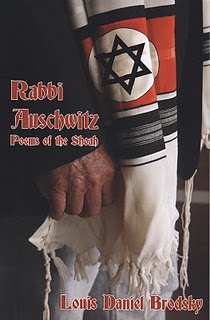
L.D. Brodsky has published somewhere between sixty and seventy books, most of them poetry collections and a notable handful of these devoted to the Holocaust, including The Thorough Earth, Falling from Heaven, Gestapo Crows and The Eleventh Lost Tribe. Brodsky’s emphasis, especially, in the later works, is on survivors and the children of survivors, in a contemporary setting, haunted by memory and imagination.
The poems in Rabbi Auschwitz all have the vertiginous, off-balance quality of nightmares. The very title of the collection combines two violently antithetical ideas, creating an impression of something shameful and forbidden, in the yoking together of the image of a Jewish spiritual guide and teacher with that of a brutal, sadistic death camp. The eponymous poem, like a number of others in the collection, takes place in a seedy St. Louis bar where the protagonist, “Rabbi Auschwitz,” customarily ushers in the Jewish Sabbath on Friday night, drowning “in a Kaddish of white noise and crimson wine,” trying to purge his memory. Other titles similarly suggest the surreal, nightmarish horror so prevalent in these poems: “The Pope Who Would be Fuhrer,” “Cattle Drive to the Emerald City,” “St. Patrick’s Day Breakdown of a Refugee,” “Flight to Hades.” Others are less surreal but no less disturbing: “Blood Libel,” “The Final Solution,” “Nuremberg Lies.”
Just as the Blood Libel itself partakes of folk legend, often Brodsky’s poems employ the nightmare elements of fairy tales to make their point. “Black Forest Tales,” for instance, begins: “Jack Speer and Jill Schwartz went up the hill,/To fetch a pail of racially mixed sex…” It continues later in the poem:
Sleeping Hebe Beauty and Cinder-and-ash-rella,
Where are you when the clock strikes midnight
And Prince Himmler strokes his Thuringer,
Heydrich pounds Goering’s bratwurst,
And the phantoms of the Grimm Third Reich brothers
Begin reciting tales of repressed kike maidens,
Exposing their own sexual frustrations,
Decadent peccadilloes, shitty political indiscretions
This is very powerful stuff, offensive if coming from some shrill anti-Semite, but bitter and ironic coming from a Jewish poet.
The people that these poems concern themselves with are all haunted by survivor’s guilt, survivor’s remorse, “afflicted with living/Amidst the still-smoldering ashes of the past.” (“Cattle Drive to the Emerald City”) The poem “Green Peas” is especially heartbreaking, opening with an epigraph from a survivor named Elaine Dommange, as quoted in USA Today, so the reader knows right away this particular nightmarish scene is grounded in reality, that “in 1942/She was eight years old,/Eating green peas in her family home in Bordeaux, France” when the local police herded her family “to the gas chambers at Auschwitz,/Left her bereft, in a matter of seconds,/An orphan, one of an estimated
The poems in Rabbi Auschwitz all have the vertiginous, off-balance quality of nightmares
2500.” As it happens, even fifty-five years later, in 1997, when she was interviewed, “this woman in her mid-sixties/Still can’t eat green peas,/Gets nauseated when she sees them on a plate.” The ashes of the past, indeed.
Echoing his 1992 collection, Gestapo Crows, Brodsky frames this three-part collection between a prologue (“Bestial Desire”) and an epilogue (“Crows’ Convention”) that focus on the image of the crow — that dark, strutting, foreboding scavenger, so like a ruthless uniformed stormtrooper, ending the collection on a cautionary note — for if it happened once, who’s to say it won’t again? Certainly not a Holocaust survivor: “”You only think they only scavenge rabbits and squirrels.”

